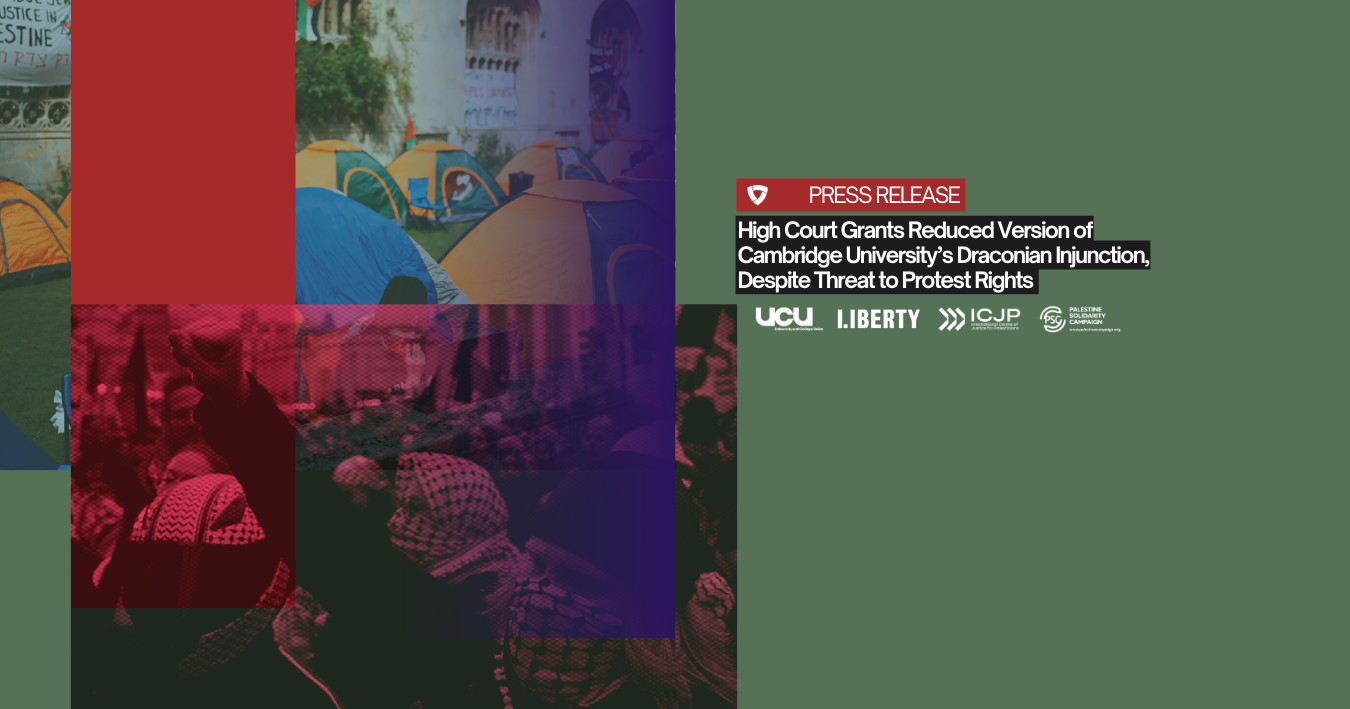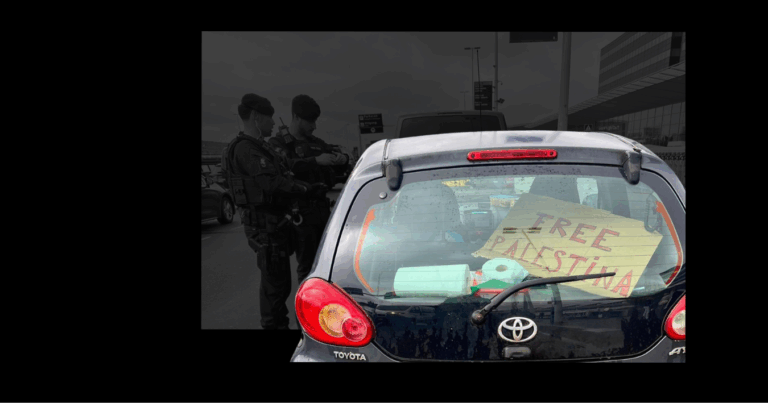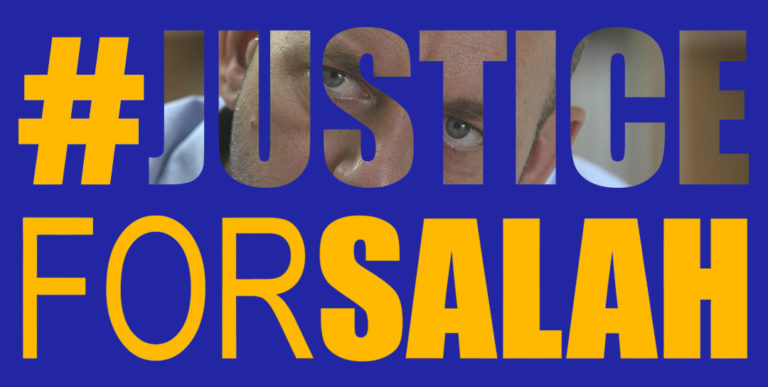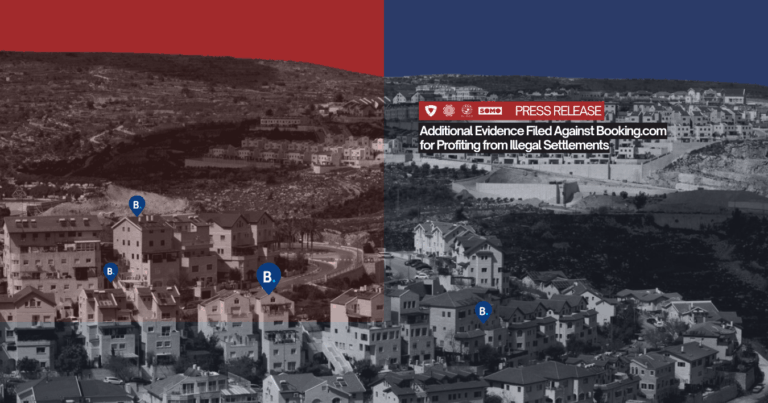High Court Grants Reduced Version of Cambridge University’s Draconian Injunction, Despite Threat to Protest Rights
On 21 March 2025, the High Court granted a reduced version of Cambridge University’s proposed sweeping injunction against Palestine-related protests in three locations on their campus. The University’s initial attempt to secure a five-year ban on 27 February 2025 was resoundingly rejected in the court, and it was forced to return this week with a significantly reduced version of its initial injunction that would apply for four months, rather than five years.
The University’s second attempt to pass this injunction has resulted in an injunction restricting access to three key University sites frequently used for protests until 26 July 2025. This is far less than the five years initially sought by the university, but human rights campaigners have called the judgment excessive and said it will curb students’ right to freedom of expression.
The University claimed that disruptions to three previous graduation ceremonies justified an injunction prohibiting all access to and protests on the land without the University’s consent, which campaigners said was ‘an attempt to silence students, academics and staff’.
The European Legal Support Centre (ELSC) and Liberty intervened, arguing that the injunction violated freedom of expression and assembly under Articles 10 and 11 of the ECHR.
Groups said the University’s decision to apply for an injunction represents a considerable crackdown on protest rights and is part of a broader pattern of punitive measures against students standing in solidarity with Palestine amid a genocide. ELSC argued that the effect of the injunction disproportionately impacts Palestinians and those with anti-zionist beliefs and support for Palestinian liberation, silencing dissent and undermining the right to political expression.
Campaigners said this judgment highlights the urgent need to resist overreaching injunctions and protect the right to protest, and urged the public to remain vigilant against attempts to criminalise solidarity and suppress voices advocating for justice and human rights.
Comments: Anna Ost, ELSC Senior Legal Officer: “It is more important than ever to resist attempts to shut down protests for Palestinian liberation. The extent of the 5-year injunction the University originally asked for demonstrated that they were seeking to restrict protests, which called out the University’s complicity in enabling genocide. Instead of acting urgently to review their investments, the University has stalled and sought to silence their critics with this injunction. We remain deeply concerned about the broader trend of universities using legal measures to target solidarity with Palestine”
Michael Abberton, Cambridge UCU President: “It is disappointing news that the High Court has retained some of the most repressive elements of this order. We remain concerned that the order granted will have a chilling effect on our members exercising their rights to peaceful protest and we will be continuing our campaign to urge the University to end its use of the courts against its own students and staff.”
Clement Mouhot, Cambridge UCU executive committee: “I am concerned that the High Court has granted this interim injunction, and dismayed that the University has expended time, effort and enormous sums of money over these repressive measures. The court decision today comes as Israeli warplanes are bombarding Gaza, killing hundreds of Palestinians. Students and staff are rightly asking why the University went to court to try and suppress their protests over atrocities being committed using weapons manufactured by BAE Systems and Boeing and other companies which remain partners and collaborators of our institution.”
Cambridge for Palestine: “The Cambridge for Palestine (C4P) coalition condemns the High Court’s decision to approve Cambridge University’s injunction against protests on Palestine, a violent move to criminalise and police our movement. Today, the court and the university have chosen to protect imperial and Zionst interests, defending genocide over the students of conscience that speak out against it. We know that this setback cannot be separated from the broader pattern of anti-Palestinian targeting that is occurring on campuses across the UK, US, and world, grounded in decades of policy based on racism and Islamophobia. We know, however, that no injunction– no policy, no threat– has lessened the steadfastness of the Palestinian people. As Israel carries out massacre after massacre in Gaza and the West Bank, we derive our resolve from steadfast people of Palestine, and will continue to direct our energy to the most pressing fight: the struggle for divestment and an end to Cambrdige’s ongoing partnership in the colonisation of Palestine. ”
Ben Jamal, Palestine Solidarity Campaign Director: “The very week that Israel has torn up the ceasefire agreement and renewed its full-scale genocidal assault against the Palestinian people in the Gaza Strip, the University of Cambridge should be taking steps to end its complicity in these crimes and supporting Palestinian students, not seeking draconian powers to silence them. While the university failed to obtain the full five-year ban on protests that it originally sought, this decision is still a chilling attack on our fundamental rights to freedom of expression and protest. The university should listen to its staff and students and cut its financial ties to companies linked to Israel’s violations of human rights and international law.”
Ruth Ehrlich, Head of Advocacy and Campaigns at Liberty: “Today’s judgment sets a dangerous precedent which will severely restrict protest rights on campus. “Students have long been at the forefront of movements for social change, whether in opposing apartheid or rising tuition fees. It is not right that universities are curbing students’ ability to do so, and creating a hostile space for people simply trying to make their voices heard. We urge universities to allow students to speak up for what they believe in on campus, and to protect the right to protest.”







